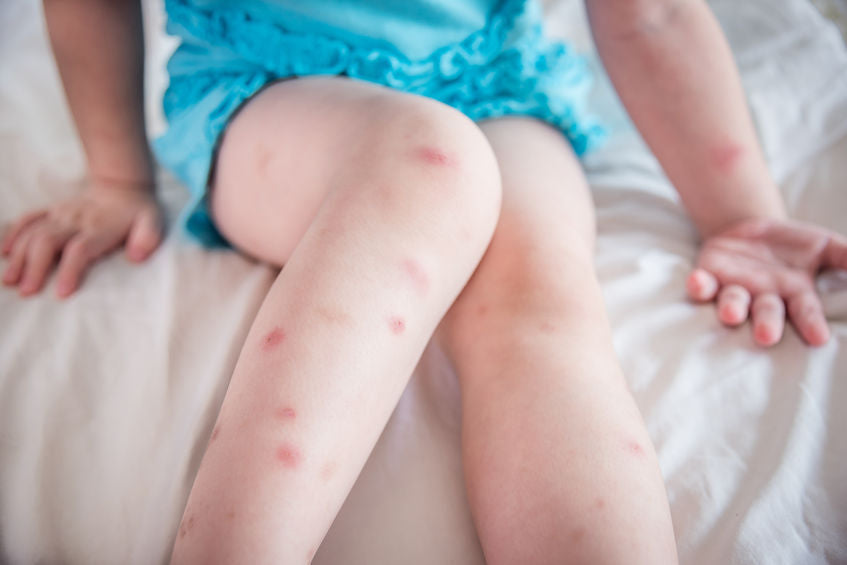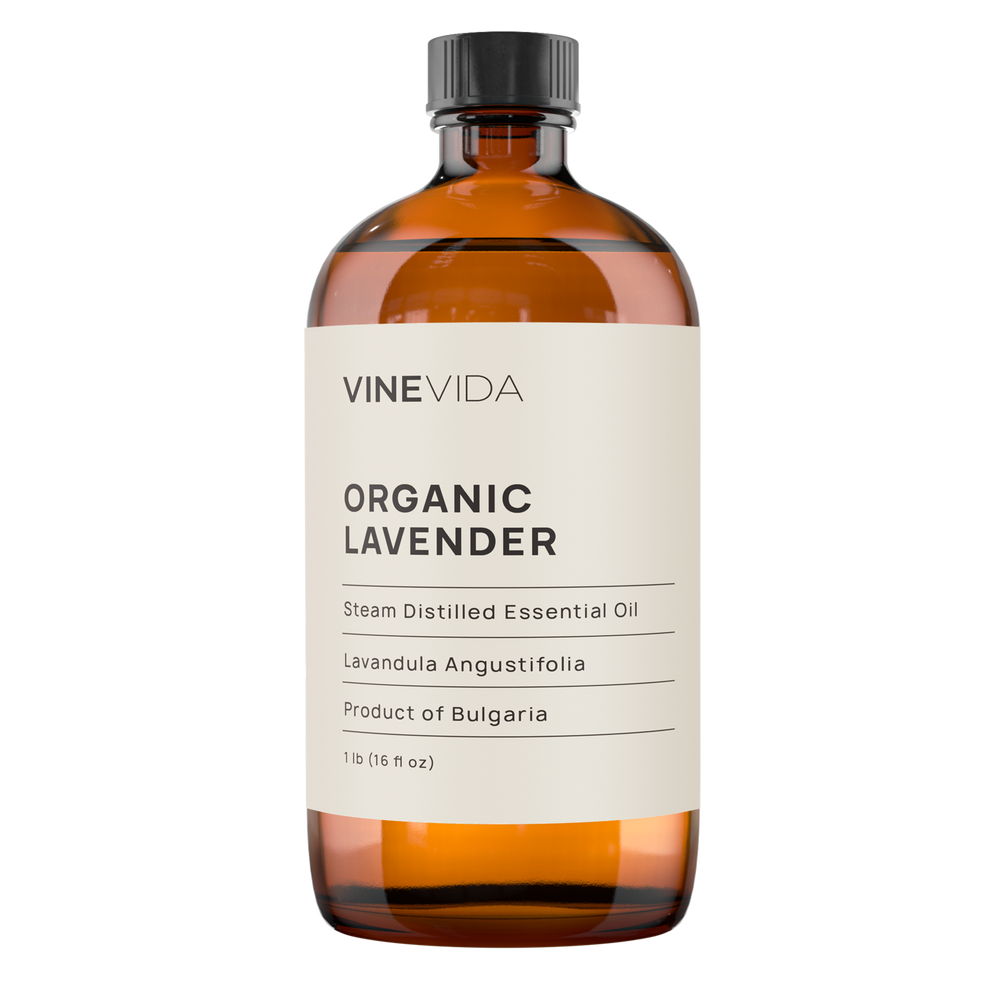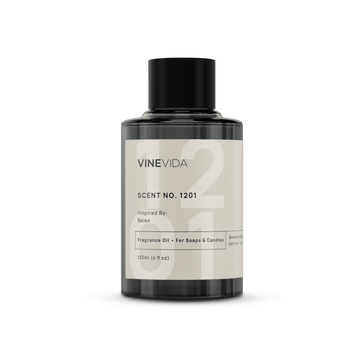Summer means lots of fun, and for most people, a lot of time outdoors. Unfortunately, it also means a lot of bugs! Bug bites will make you want to scratch away at them for relief, but in reality, this only leads to more pain and the potential risk of infection. Thankfully, we’ve come up with a list of the best essential oils for bug bites that can help give you some natural relief!
Essential Oils for Bug Bites: Quick Facts
Herbalists have used plants such as lavender and chamomile to soothe the skin since at least the time of the Ancient Greeks.
Many plants contain chemical constituents that can support healthy immune function while the body heals.
The medieval herbalist Paracelsus created a theory called the Doctrine of Signatures that helps to understand the medicine of a plant. He believed that plants with generous nectar flow were heart-opening because of their generosity to the insects. In addition, he thought that many of the plants that insects enjoyed most had signatures, which meant they would also be good for bites and stings.
Also Read: Insect Repellent Essential Oils
Do Essential Oils Work for Bug Bites
This is a contentious question. Essential oils are not drugs. They do not carry licenses and have not been tested in clinical trials. As such, we wish to observe the FDA’s medicine control laws and say that essential oils cannot “Cure or treat” anything. Neither of our advice on this page is meant as a medical advice substitution.
That being said, antibiotics were invented by Alexander Fleming and Louis Pasteur in the nineteenth century. Before that, plants were the only medicines available, and many were used as herbal treatments for skin conditions and bites.
Today, scientific evidence is beginning to verify some herbalists’ claims. Since mosquitoes kill more people a year than any other animal, technologies that may be able to influence insects are attractive propositions. Interestingly, essential oils are exactly that. They are the distilled chemicals that plants use to communicate with insects, sometimes to pollinate, but other times to repel them or help to heal after they have been injured.
For this reason, there is robust scientific evidence that shows that insects do indeed interact with essential oils. Further, traditional medicine has always used plants to soothe and heal the skin.
Also Read: Does Peppermint Oil Repel Mice?
What You Should Know Before Purchasing Essential Oils for Bug Bites
All essential oils should always be diluted before putting them onto the skin. All cases on this list are diluted to 3%, meaning 3 drops in a teaspoon of carrier oil. We have several carrier oils available on the site, but in case of an emergency, cooking oil, honey, or even a bit of butter will do.
Also Read: Does Peppermint Essential Oil Repel Mosquitoes?
What Essential Oils are Best for Itchy Bug Bites
Tea Tree Essential Oil

Native to Australia, the tea tree is famous in traditional medicine for its healing properties and benefits. Tea tree acts as a natural antihistamine, helping to reduce allergies and itching symptoms, making it one of the best essential oils for bug bites. Studies indicate that using tea tree oil for bug bites can also help reduce swelling, which can be another side effect of bites. It also offers antibacterial properties, which can help prevent further infection, particularly if the bite becomes an open wound through scratching.
One of the most common over-the-counter treatments for bug bites is hydrocortisone cream. It is a steroid cream and is highly effective at treating symptoms of bug bites such as itching and swelling. However, compared to cortisone cream, a study on chamomile essential oil found chamomile to be even more effective! Patients using chamomile saw an increase in healing and a reduction in itching and redness. Most aromatherapists favor chamomile essential oil for itchy bug bites because it is gentle enough to use on the most reactive skins and is perfect for kids.
Lavender is famous for its calming and soothing effects on both the mind and the skin. We think most aromatherapists would agree that lavender can stop bites itching in seconds. Current research shows it can speed up wound healing in the early stages. Lavender also contains antibacterial properties, which means using lavender oil for bug bites can help keep your bites from becoming infected. Studies also indicate that lavender oil is effective at repelling mosquitoes. Try creating your bug spray with lavender oil and witch hazel to prevent bites in the first place! Some internet pages also recommend lavender essential oils for spider bites.
Peppermint essential oil is one of the best essential oils for bug bites due to its cooling properties. Mint oils contain menthol, which is one of the most potent analgesics in nature. This means peppermint oil for bug bites can help dull pain and itching, while the cooling sensation will help relieve the heat due to inflammation.
Be careful of using peppermint essential oil on small children, though. Menthol slows respiration and should only be used if the bit is away from the child’s face. In that, we consider that hands go close to faces.
If you only have peppermint oil, you must use the tiniest dilution on a child. We would recommend going as low as 0.25%. To make that easier, add more carrier oil. We’d recommend 3 drops in a teaspoon of carrier oil for an adult, but just 1 drop in a tablespoon full of carrier oil for a child (reread that to ensure you saw the difference in spoon sizes).
Similar to peppermint essential oil, eucalyptus oil offers the same cooling effect. This will help relieve pain and itching while assisting minor wounds in healing. Also native to Australia, eucalyptus contains eucalyptol, an ingredient in many over-the-counter medications. It is also an anti-inflammatory agent, which means it can help reduce swelling and redness. This is probably the commercial manufacturers’ favorite essential oil bug repellent. It is a great one for adding to an essential oil bug spray. Be aware, though, that since plant molecules evaporate, it may only be valid for around 3 hours before you need to reapply.
Again, we’d want to be careful of using eucalyptus essential oil on small children. This time, it is a constituent called 1,8-cineole that slows respiration. So again, we would only want to use it if the bite is away from the child’s face.
Perhaps you’ve only got eucalyptus in your handbag; then you must use the tiniest dilution on a child. We would recommend going as low as 0.25%. To make that easier, add more carrier oil. We’d recommend 3 drops in a teaspoon of carrier oil for an adult, but just 1 drop in a tablespoon full for a child (Reread that to ensure you see the difference in spoon sizes).
A Bonus Nugget…The Best Essential Oil for Bee Stings
You’ll find it growing in most gardens… You might know it by the name lemon balm. The name Melissa is the ancient Greek word for bee, and the chemistry of the plant is virtually identical to a pheromone they secrete to communicate with each other. Melissa is often used in traditional medicine as a natural antihistamine, relieving stings quickly. You might notice that is exactly what Paracelsus says in his Doctrine of Signatures. Melissa blended with lavender and chamomile is a very effective blend for bee stings.
Essential Oils to Avoid
While we recommend using cooling oils, such as peppermint oil, for bug bites, we advise against warming oils. This includes cinnamon oil, ginger oil, and even oregano oil. These oils may increase heat and swelling in the area.
Also Read: Cedarwood and Bugs
What to Look for in A High-quality Essential Oil for Bug Bites
Check the dates on your bottles. Essential oils are made up of many chemical groups. Different chemicals decay at different speeds. Oils that are rich in monoterpenes oxidize quickly. When that happens, this can lead to skin sensitivity and rashes. As the rest of the groups deteriorate, they lose more of their properties. All the oils on the list have a shelf life of about four years.
Also Read: Best Essential Oils For Mosquito Bites.
Using Essential Oils for Itchy Bug Bites: The Best Methods
 Now that you know what essential oil is good for bug bites, it is time to learn how best to use them!
Now that you know what essential oil is good for bug bites, it is time to learn how best to use them!
Spray
Essential oils require dilution before applying directly to the skin. This is easy to do when making a spray. When balancing out your dilution, you want to use 2-3 drops of essential oil with equal amounts of carrier oil, such as coconut. Use this measurement for every ounce of water you use. Before spraying, shake the bottle well to combine and apply directly to bites.
Bath
If you’ve just come back from camping only to discover your entire body is covered in mosquito bites, you might want to hop in the tub! Add 5-10 drops of the best essential oils for bug bites to an equal amount of carrier oil. Mix into the water once the bath is full to achieve the best effect. If you’re trying to beat the heat, you can even use this technique for a cooling foot soak—just use less!
Cream
Follows the same method of adding 3-5 drops of essential oil to an ounce of carrier oil. You can also use any base lotions and creams you wish. Then apply this to the bug bites using clean hands or a cotton bud.
Also Read: Best Essential Oils for Fleas.
Homemade Bug Repellent and Bug Bite Relief Blend
Here is a great soothing blend to use in an emergency.
DIY Bug Bite Salve
- 3 tbsp Sweet Almond Oil (Prunus Dulcis)
- 1 tbsp Aloe Vera Gel
- 15 Drops of Lavender Essential Oil (Lavandula Angustifolia)
- 5 Drops of Peppermint Essential Oil (Mentha Piperita)
- 4 Drops of Chamomile Essential Oil (Anthemis Nobilis)
How to use:
Combine all ingredients in a glass jar and store in a cool, dry place. Shake before using.
Safety: Not suitable for use during the first 16 weeks of pregnancy.
Follow the Following Steps if a Bug Bites You or Your Child
First, where has the child been bitten?
Close to the eyes, the lips, or inside the mouth can be more dangerous. Seek medical attention immediately, and do not use essential oils on these areas.
In the case of stings, you will always want to check that the stinger is out, so no more venom is released. In the case of bites, the same applies; ensure the area is clean if more poison is on the skin. In both cases, give it a good wash with soap and water.
Cold compresses are soothing. Soak your cloth in cold water, then place it over the affected area for about ten minutes. Try to elevate the area, which can help the pain.
Then use your essential oils.
We’d recommend a dilution of 3% for adults, but it is much smaller for children.
Use a 1% dilution equal to one drop of essential oil in a teaspoon of carrier oil. Adding more oils to the mix is fine, but not a larger dilution of the same oils.
Precautions
Though the internet might tell you otherwise, avoid putting essential oils in direct contact with your skin. They are very potent, and many oils can cause burning or irritation. This can be very painful, especially if you try to put raw oil on top of a bug bite! You must always dilute essential oils first, following reputable guidelines such as those by the National Association of Holistic Aromatherapists. You should also never use essential oil internally, so keeping them well away from animals and small children is necessary.
Regarding bug bites, it is vital to be aware of when it is essential to seek medical attention. If you believe you may have been bitten by something vicious, you should seek help immediately.
Additionally, any bug bites that don’t seem to be improving or look like they are potentially infected should be looked at. Wear appropriate protective clothing and spray outdoors if you suspect a risk of bug bites!
Conclusion
As much as we hate to admit it, bug bites are often an unwelcome part of spending time outdoors. However, we hope our list of the best essential oils for bug bites can help offer some relief! If a minor bug bite irritates you, try one of these essential oils for itchy bug bites to help reduce itching, scratching, swelling, and redness. Try to protect yourself outdoors with bug spray and protective clothing.
If you believe you have been bit by something evil, seek medical attention as soon as possible. The same goes for bug bites that look infected or start having other symptoms, such as fever or dizziness.



















